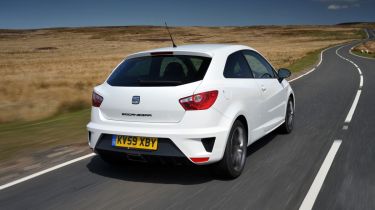SEAT Ibiza Bocanegra
Hot SEAT flagship offers GTI’s running gear in a racier looking package
The Bocanegra badge will be something of an unknown to most SEAT buyers in the UK. However, it harks back to one of the most significant models in the company’s history. It translates from Spanish as ‘black mouth’, and relates directly to the distinctive design treatment first applied to the 1200 Sport model in 1975.
The current Bocanegra is based on Ibiza Cupra underpinnings, but features a gloss black nose, which attracts a lot of attention. Combined with the smoked headlamp lenses, it gives the supermini an aggressive attitude.
Video: watch CarBuyer's video review of the SEAT Ibiza
[[{"type":"media","view_mode":"content_narrow","fid":"68319","attributes":{"alt":"","class":"media-image"}}]]
Elsewhere, there’s little to distinguish this special model from the car it’s based on, and it retains the Cupra’s centre-exit exhaust and deeper bumpers. Overall it’s a distinctive shape with a mixture of curves and creases that leaves the bodywork looking taut and muscular. It’s certainly more like a concept car than the subtle Polo, and this ability to turn heads will be justification enough for many hot hatch buyers.
The SEAT is more adventurous inside, too. The cabin mimics the flowing bodywork, with a sweeping dashboard structure intersected by circular air vents and a pair of deeply cowled dials. Carbon-effect trim appears throughout, while the dark upholstery used for the seats, headlining and dash combines with tinted glass to make the interior slightly gloomy.
Used - available now

2018 Nissan
Qashqai
32,700 milesManualPetrol1.3L
Cash £12,800
2021 Mercedes
A-Class
41,000 milesAutomaticPetrol1.3L
Cash £17,300
2020 BMW
X2
46,200 milesAutomaticPetrol2.0L
Cash £17,200
2016 Audi
S3 Sportback
54,700 milesAutomaticPetrol2.0L
Cash £17,000Only the neat white-on-black instruments and red stitching on the seats and wheel lift the sombre atmosphere. The rim itself is a perfect size and looks good, but like the rest of the cabin, it can’t match the quality of materials provided by the Polo.
Getting comfortable up front is easy, and thanks to a higher window line and dashboard, the driving position feels lower than in the Polo. However, the sloping roofline means headroom is tight for rear passengers.
Turn the key, and the gruff exhaust note sounds more purposeful than the GTI’s. The volume increases through the rev range and becomes strained at the top end. In fact, the whole driving experience is more raw than in the VW. Both cars use a twin-clutch seven-speed DSG gearbox, and that means acceleration is impressive.
In our hands the Ibiza sprinted from 0-60mph in 6.7 seconds – just a tenth behind the VW.
Our only criticisms of the system are its tendency to kick down – even in manual mode – and occasional jerky progress when moving off.
The Bocanegra’s stiff suspension means rough surfaces are instantly transmitted into the cabin. But the trade-off is impressive body control when cornering. The light steering doesn’t inspire confidence, though, and while the chassis grips well, it isn’t that engaging.
Confusingly, despite sharing the same engine, our two hot hatches quote different fuel economy figures. Our short time with the cars wasn’t enough to provide a representative return, although the SEAT lags 3.8mpg behind at 44.1mpg on the combined cycle and has poorer CO2 emissions, leaving it in a higher tax bracket.
There’s a lot to recommend the Ibiza, not least its £1,030 price advantage, plus it’s a capable hot hatch. But can the Spanish flier beat the heritage afforded by the GTI badge on the latest Polo?
Details
Chart position: 2
WHY: Racy SEAT arrived before Polo GTI, but despite using the same technology, it offers a rawer driving experience. The black nose means this special model looks a lot racier than its German brother.







